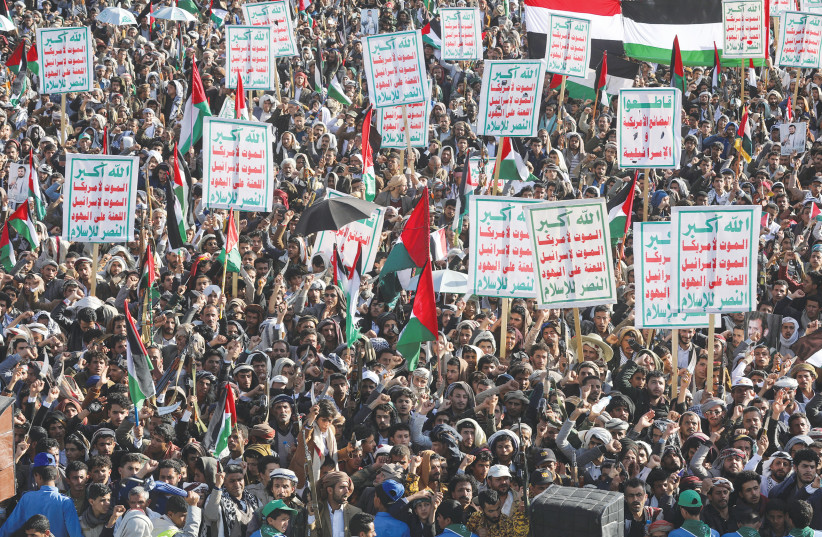In recent years, several top officials of Arabian Gulf states have participated in Holocaust commemorations.
In January 2020, Dr. Sheikh Mohammad al-Issa, the secretary general of the Muslim World League and Saudi Arabia’s former justice minister, led a delegation of more than 60 prominent Arab Muslims, including 25 religious leaders, on a groundbreaking visit to the Nazis’ notorious Auschwitz-Birkenau death camps to mark the 75th anniversary of its liberation.
The many articles he wrote on Holocaust remembrance and the need to combat antisemitism were significant demonstrations of brotherhood from a Muslim leader toward the global Jewish community.
The same year, Sheikh Abdullah bin Rashid bin Abdullah Al Khalifa, the ambassador of Bahrain to the United States, joined me in events marking the 82nd anniversary of the “Night of Broken Glass” (Kristallnacht), the Nazi-orchestrated violence against Jews and their property on November 9 and 10, 1938, which ushered in the Holocaust.
In recent years, too, His Majesty Hamad bin Isa al-Khalifa, the king of Bahrain, directed his diplomatic corps to participate in Holocaust commemorations in Europe.

Gulf leaders have also publicly expressed interest in the history of their Jewish communities and launched programs or took part in events addressing antisemitism. Last year, the United Arab Emirates’s embassy in Washington announced that the country would include Holocaust education in schools’ curricula, becoming the first country in the region to do so.
This comes in a period of growing worldwide antisemitism, including during the ongoing war between Israel and Hamas. That’s why it remains in global Jewry’s interest to educate people about the evils of antisemitism. We must encourage the teaching of this truth to children in the Middle East every day to prevent lies and ignorance from endangering the world again.
Holocaust education in the Middle East
I’ve been thinking about this Saturday’s International Holocaust Remembrance Day. I’ve also reflected on the comments made last week by Prince Faisal Bin Farhan al-Saud, the foreign minister of Saudi Arabia, at the World Economic Forum in Davos about his country’s desire to normalize relations with Israel after the creation of a Palestinian statehood.
It became clear to me that, hand-in-hand with normalization, creating a peaceful and respectful environment requires more educational, spiritual, intercultural, and interreligious initiatives in the Middle East. We can do this primarily by deepening interfaith dialogue.
To advance Muslim-Jewish relations following the Israel-Hamas war, we should also hold an exclusive conference on antisemitism hosted by an Arabian Gulf country. While many conferences on Islamophobia have been hosted in the West, Muslim countries have never hosted a conference exclusively devoted to addressing antisemitism and learning about its history.
An international conference hosted in that region will highlight the importance of fighting antisemitism. It will signal a wish for cooperation and friendship with the global Jewish community, particularly since the horrific Hamas attacks against Israel on October 7 have awakened the trauma of the Holocaust for so many Jews around the world.
As Dr. Sheikh Mohammed al-Issa said on CNN last year, “The truth can set us free. And the truth of the Holocaust must continue to open our eyes to the horrors humankind is capable of inflicting – and help guide us to the truth of our common humanity and our shared destiny.”
The history of the killing of six million Jews by Nazi Germany is little taught in the Arab world, where some politicians incorrectly claim that the Holocaust was used to justify the creation of Israel in 1948 at the expense of Palestinian Arabs.
I hope that a conference on antisemitism will help Arabs and Muslims around the world to better understand the Holocaust and the history of this unique form of intolerance. They then will understand the absolute need for the State of Israel, a country that, sadly, so many people among them still fiercely reject and a country in which Jews have always lived.
Let’s launch plans on International Holocaust Remembrance Day for this turnaround. The unspeakable anguish and oppression suffered by the Jewish people for two millennia is commemorated that day – the anniversary of the liberation of the Auschwitz-Birkenau inmates. From now on, January 27 will also mark the day we begin eliminating the evil of antisemitism.
The writer is president of the Foundation for Ethnic Understanding and co-author of Sons of Abraham: A Candid Conversation about the Issues That Divide and Unite Jews and Muslims.
